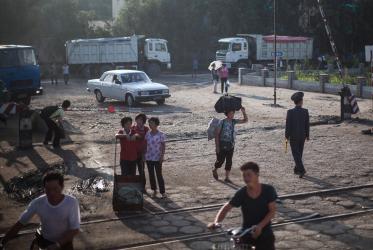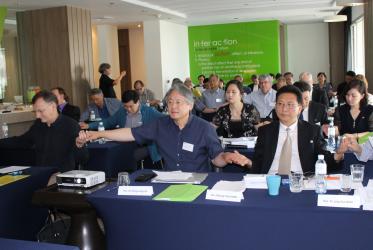Adopted by the WCC 10th Assembly as part of the Report of the Public Issues Committee.
“For he is our peace; in his flesh he has made both groups into one and has broken down the dividing wall, that is, the hostility between us.” (Eph. 2:14)
We, the delegates of the 10th Assembly of the World Council of Churches (WCC) meeting in Busan from 30 October to 8 November 2013, bear witness to the suffering of the men, women and children of the one Korean people through decades of violence caused by war and hostility that have left them divided into two nations.
Division, war and the suffering contradict God’s will for the fullness of life. Therefore, we call upon the churches of the world, and upon those holding social, economic, political and governmental power, to pursue a lasting and sustainable peace with justice that will reunify and reconcile the people of Korea.
The central theme of our assembly is a simple prayer, “God of life, lead us to justice and peace.” It is our prayer that the vision and dream of all Koreans, their common aspiration for healing, reconciliation, peace and reunification may be fulfilled.
New Challenges to Reconciliation and Healing
The present situation in the Korean peninsula prompts us to a renewed engagement in efforts to work for peace and justice throughout the region and for the reunification of a divided Korea. Despite many positive developments in the world during the post-Cold War era, the North East Asia region still contains the world’s heaviest concentration of military and security threats. Four of the five permanent members of the UN Security Council, who are also recognized nuclear weapons states, have military bases in this region. There are even signs of an emerging “new Cold War”, as the geopolitical map of North East Asia shows new shifts in the balance of power. New tensions are arising with the intensified political, economic and military presence of the United States in the region; and three other “power poles”, China, Japan and Russia, also are active in this region.
Changing geopolitical dynamics among the four major powers could stifle the aspirations and hopes of the Korean people for peace and reunification. Increasing arms build-up in several Asian countries make this one of the fastest-growing regions for military spending in the world, including nuclear arms and high-tech weapons of mass destruction.
The peace we envision is a condition of justice embracing the whole of life and restoring harmony among neighbours. We are convinced that it is the right time to begin a new process towards a comprehensive peace treaty that will replace the 1953 Armistice Agreement and secure just and peaceful relations among nations in the region while normalizing relations between North and South, and facilitating Korean reunification.
As delegates representing 345 churches and some 560 million Christians around the world, we are prepared to renew our support for peace and reconciliation, and to encourage and assist the national and international leaders whose efforts are indispensable.
Our Faith Commitment to Peace with Justice
As a global body of believers in Jesus Christ, we confess our sins in having given in to the powers and principalities of the world in their wars and military conflicts full of hate and enmity, armed with nuclear arsenals and weapons of mass destruction targeting humanity and the whole of God’s creation. Also we lament our failure to adequately acknowledge the Korean people’s long suffering, caused by external powers fighting for colonial expansion and military hegemony.
We hereby join the Christians in Korea in their confession of faith in Jesus Christ, who came to this world as our Peace (Ephesians 2:13-19); who suffered, died upon the Cross, was buried, and rose again to reconcile humanity to God, to overcome divisions and conflicts, and to liberate all people and make them one (Acts 10:36-40); who, as our Messiah, will bring about a new Heaven and new Earth (Rev. 21-22).
With this confession, we join in firm commitment with the Christians of Korea, both North and South, especially in Korean churches’ faithful actions to work towards peace, healing, reconciliation and reunification of their people and their land.
Faith and Hope in Action
Ever since its 1st Assembly in 1948 and the Korean conflict that followed, the WCC has felt the pain of Korea’s division and to some degree has found it reflected in tensions among members and partners. We are well aware of the challenges and obstacles on the pathways to peace. We recognize the painstaking effort of Christians in Korea, both North and South, and recall the continued and sustained efforts of the WCC and its ecumenical partners in accompanying the people of the Korean peninsula.
In the midst of an extremely difficult situation, the Korean churches’ ecumenical witnesses and prayers have been pivotal. Such faith in action led them to new horizons of hope with prayers. The Tozanso Consultation, organized by the WCC Commission of the Churches on International Affairs (CCIA) in 1984, was held at a time when it was difficult for the Korean churches to openly discuss the issue of Korean reunification. The Tozanso Consultation was the first attempt by the WCC to bring Christians from a wide spectrum of member churches worldwide together with Christians from Korea, to look at some of the issues raised by the division of the Korean peninsula. The WCC initiative helped to address the issues of the division of Korea and Korean reunification as means to strengthen the Korean people’s struggle for peace with justice.
In 1988 the decisive Declaration of Korean Churches for National Unification of the Korean People and Peace in the Korean Peninsula set 1995 as the Year of National Jubilee for the churches in North and South, and affirmed the five principles of: 1) self-reliant unification, 2) peaceful unification, 3) national unity through trust and cooperation, 4) democratic unification by people's participation, and 5) North-South relations based on a humanitarian approach.
We recognize the value of ecumenical engagement in advocacy initiated by the WCC addressing peace and reconciliation as well as denuclearization of the Korean peninsula. Those initiatives provide avenues for North and South Korean church leaders as well as church and ecumenical partners from Asia, North America and Europe to come together within the setting of a common platform. The Ecumenical Forum on Peace, Reconciliation and Reunification of the Korean Peninsula, coordinated and facilitated by the WCC/CCIA with the participation of churches in Asia, Europe and North America in addition the churches in South Korea and the Korean Christian Federation in North Korea has provided additional and frequent opportunities for mutual dialogue and interactions on peace and reunification. Although progress has been made at various levels, there is still a long way to go to accomplish the mission of peace and reunification on the Korean peninsula.
We recall that major WCC events in the past have been venues for historic meetings of church leaders of North and South, starting with the Moscow central committee meeting in 1989 and including WCC assemblies in Canberra (1991), Harare (1998) and Porto Alegre (2006). Various other international consultations held subsequently with the participation of churches from North and South Korea lent further authenticity to ecumenical advocacy on peace and reunification of the Korean peninsula. The international consultation organized by the CCIA in conjunction with the 25th anniversary of the Tozanso process in October 2009 helped to provide new impetus for working towards the goal of witnessing for peace, justice and unity, and it encouraged dialogue and participation for all who have been affected by the tragedy of division. In addition, visits to North Korea by the WCC general secretaries in 1999, 2009 and 2013 have lent credence to the commitment of the WCC and its member churches in supporting the churches in North and South Korea seeking peace and reunification.
We are conscious of the fact that the prevailing geo-political context of the Korean peninsula warrants that the ecumenical movement develop new ways of accompaniment and engagement. As the WCC has been accompanying the churches and people in the Korean peninsula in their struggle to achieve peace with justice and reconciliation, and reunification of the divided Korean peninsula, it is imperative that every effort continue to be taken in providing common platforms for both North and South Korean churches to meet together, with a particular focus on younger generations.
We also discern signs of hope and a framework that would enable the Korean peninsula to embrace peace with justice and fullness of life. On the Korean peninsula, shared human security and human rights must become a greater priority than divisive, competitive and militarized national security. The threat of nuclear weapons has long been recognized, and now serious questions are raised concerning all nuclear energy. With many in the world, the churches share the conviction that a world without nuclear weapons is both necessary and possible. Our shared hope for a nuclear-free world would not only be for the people of the Korean peninsula but for all people in the world, renouncing nuclear weapons and working together for their complete dismantling, leading other regions and showing the way. Hope and possibilities such as these motivate the churches to make greater efforts to work for peace and reconciliation on the Korean peninsula in response to God’s promise to lead us towards justice and peace as hallmarks of God’s reign. “For he is our peace; in his flesh he has made both groups into one and has broken down the dividing wall, that is, the hostility between us.” (Eph. 2:14)
The Way towards Healing, Reconciliation and Peace
During the sixty long years since combat ceased in the Korean War, through the Armistice Agreement of July 27, 1953, the two Koreas, the USA and China have nevertheless continued in a technical state of war with defensive military build-ups including the stockpiling of nuclear weapons. The current situation proves the urgent need for a peace treaty to replace the 1953 Armistice Agreement.
Fresh and decisive action is required to enact a peace treaty. A process towards a peace treaty is crucial for the Korean peninsula and in the entire North East Asia region, as well as contributing to the process of building a nuclear weapon-free peace zone in this region. The peace treaty must be discussed and agreed by the parties to the Armistice Agreement and the countries related to the Armistice Agreement. We believe that a declaration of the end of the Korean War shared by stakeholders will accelerate the agreement’s conclusion and contribute to mutual trust and confidence-building among them. Participants in the Six-Party Talks (SPT) previously promised to hold peace forums in order to convert the prevailing armistice system into a concrete peace system. We strongly urge South and North Korea, the USA and China to ensure the keeping of this promise. At the same time, the USA and Japan should stop imposing blockades and sanctions against the North, while China should act in its facilitator’s role in order to resume dialogues, including the Six-Party Talks.
Taking into consideration the continuing humanitarian crisis in the North, we urge the international community to initiate humanitarian support to the people while cooperating with the North in projects for its sustainable development. It has become clear that economic sanctions serve primarily as instruments for punishing the people of a country, especially the poor in any society. Therefore, we question the ethical principles as well as the strategic effectiveness of economic sanctions imposed on North Korea. It is in this context that we raise concern about the UN Security Council Resolutions against North Korea. Opportunities for economic exchanges between the North and other countries in the world must be resumed. This will open new avenues for effective economic collaboration. Above all, this will facilitate active engagement through dialogue to normalize relations. The UN should also initiate efforts for peace-building across the Korean peninsula and lift the existing economic and financial sanctions.
The way forward - Recommendations
We believe that peace-building in a globalized and interdependent world is a shared responsibility of sovereign states, the United Nations and civil society groups including the churches. Affirming the Christian calling to be peacemakers and responding to the faith witness of the Korean churches, which have proclaimed the Jubilee among the Korean people, the member churches of the WCC, gathered in Busan, Republic of Korea for the WCC 10th Assembly from 30 October to 8 November 2013, together affirm the following:
- Realizing that as we pray with and for the peoples of Korea the churches and ecumenical partners have a specific responsibility toward working together for peace and reconciliation in the Korean peninsula with renewed energy, in close partnership and transparent relationships with each other and with the churches and Christians in both North and South of Korea, the National Council of Churches in Korea and the Korean Christian Federation. We, therefore, commit ourselves to:
a) Embody the spirit of the Tozanso process including courage, caring, communication, confession, conciliation and commitment;
b) Pray with the peoples and churches of Korea by designating the Sunday before 15 August as the “Sunday of Prayer for the Peaceful Reunification of the Korean Peninsula”;
c) Provide a wide ecumenical platform for young generations both in North and South Korea to meet together in order to envision a desirable future of the Korean Peninsula;
d) Organize solidarity visits to churches in North and South Korea that can serve as peacemakers and bridge builders. A first visit can be organized as early as 2014, commemorating the 30th anniversary of the historic Tozanso International Consultation; and
e) Continue accompanying the churches of Korea by providing common platforms for churches and Christians from both North and South to meet together in order to advance towards reconciliation and peace. We recognize that a historically symbolic moment for such initiatives could be found in 2015, the 70th anniversary of the liberation of Korea.
- Furthermore, we commit ourselves to take actions to:
a) Work with our governments to mandate the United Nations Security Council to initiate new efforts for peace-building across the Korean Peninsula and to lift the existing economic and financial sanctions imposed on the Democratic People’s Republic of Korea;
b) Embark upon a universal campaign for a peace treaty to replace the Armistice Agreement of 1953, bringing an end to the state of war;
c) Call upon all foreign powers in the region to participate in a creative process for building peace on the Korean peninsula by halting all military exercises on the Korean peninsula, by ceasing their interventions and reducing military expenditures;
d) Ensure the complete, verifiable and irreversible elimination of all nuclear weapons and power plants in -North East Asia, by taking steps to establish a Nuclear-Free World and simultaneously joining the emerging international consensus for a humanitarian ban on nuclear weapons in all regions of the world, so that life is no longer threatened by nuclear dangers anywhere on earth;
e) Urge the governments in both North and South Korea to restore human community with justice and human dignity by overcoming injustice and confrontation, and to heal human community by urgently addressing the humanitarian issue of separated families, by establishing a sustainable process allowing confirmation of the whereabouts of family members and free exchanges of letters and visits, and by offering the support of international agencies where necessary; and
f) Work with the governments of the Democratic People’s Republic of Korea and Republic of Korea in providing international cooperation to maintain a truly Demilitarized Zone (DMZ) and transform it into a zone of peace.
APPROVED
The following delegates and entire delegations wished to register their dissent that the statement does not include a concern of special relevance to the Korean peninsula, namely the plight of conscientious objectors to military service:
Evangelical Church in Germany
Waldensian Church
Church of the Brethren
Church of the Brethren in Nigeria
Eglise du Christ au Congo - Communaute mennonite au Congo
Mennonite Church in Germany
Mennonite Church in the Netherlands
Friends United Meeting
Canadian Yearly Meeting
Ms Eun-Young Lee, Korean Methodist Church
Ms Alison Jane Preston, Anglican Church of Australia
Rev. Sarah Campbell, United Church of Christ
Rev. Kelli Parrish Lucas, United Church of Christ


